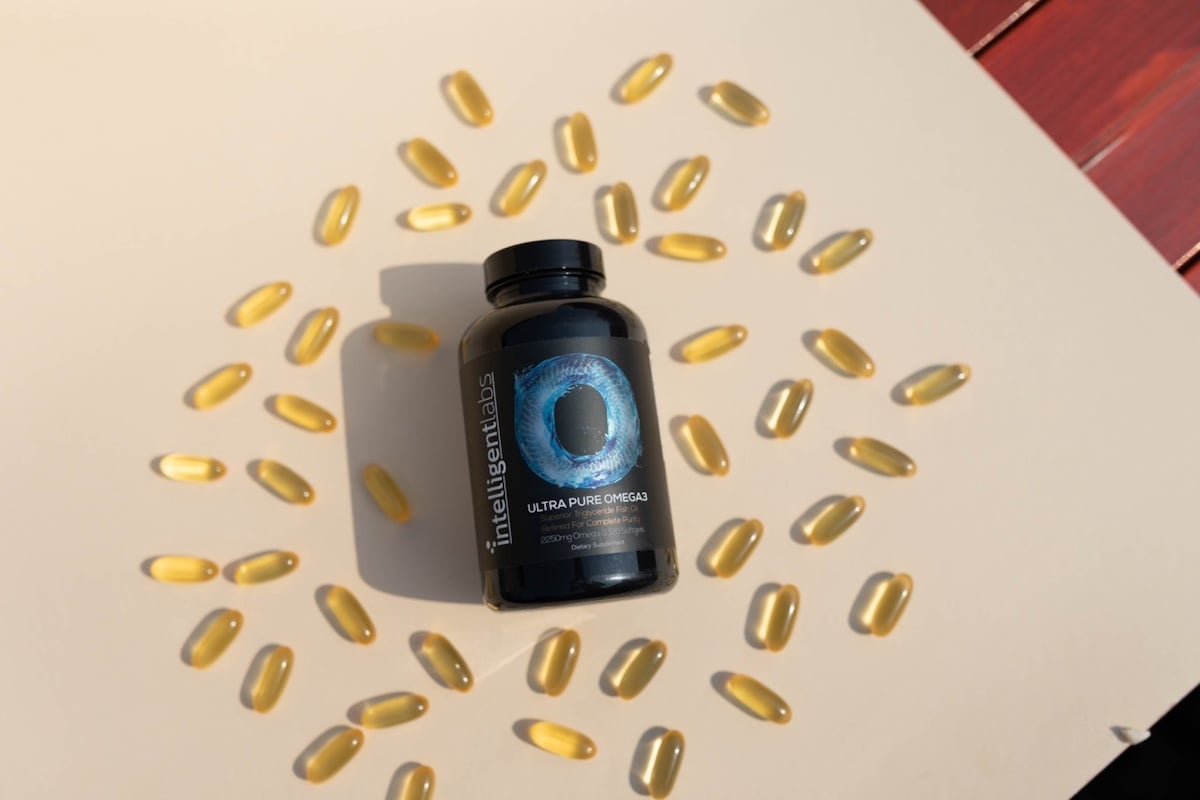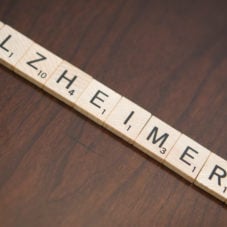Omega-3 fatty acids are essential nutrients with well-documented health benefits, but how much should you take each day? With conflicting advice ranging from a few hundred milligrams to several thousand, it can be hard to know what’s best.
In this article, we’ll simplify the science and provide clear, research-backed guidance to help you find the right daily omega-3 dose for your health!
Table of Contents
How much Omega-3 per day (DHA and EPA) is safe?
Before diving into dosages, let’s briefly cover the 2 main types of omega-3 fatty acids – DHA and EPA.
DHA (docosahexaenoic acid) supports brain, eye, and skin health,1 so sufficient DHA levels is essential for these organs to function properly. EPA (eicosapentaenoic acid), on the other hand, fights inflammation and helps promote a healthy cardiovascular system.2
Now, how much EPA and DHA do you need? Here’s a table of recommendations for different health conditions based on scientific research:
| Health Condition | EPA + DHA Recommended Daily Dosage (with Scientific Source) | Intelligent Labs’ Fish Oil Supplement Recommended Dosage |
| Reduce inflammation associated with autoimmune conditions like arthritis and Crohn’s disease | At least 2,700mg DHA+EPA3 | 3 softgels daily |
| Reduce triglycerides | 2,000-4,000mg DHA+EPA4 | 3 softgels daily |
| Improve cholesterol levels | 2,300mg-4,000mg DHA+EPA in 3:2 ratio5 | 3 softgels daily |
| Blood pressure reduction | At least 3,000mg DHA+EPA6 | 3 softgels daily |
| Heart attack risk | At least 1,000mg DHA+EPA7 | 3 softgels daily |
| Improve cognitive function | At least 1,000mg of DHA8 | 3-4 softgels daily |
| Exercise and sports training recovery | At least 1,800mg DHA+EPA9 | 3 softgels daily |
| Increase muscle mass | At least 3,860mg DHA+EPA10 | 4 softgels daily |
| Healthy pregnancy | At least 2,500mg DHA+EPA11 | 3 softgels daily |
| Depression (adult) | 1,000mg-6,600mg DHA+EPA in 3:2 ratio12 | 3 softgels daily |
| Depression (child of 6-12 yrs) | 600mg DHA+EPA13 | 1 softgel daily |
| Manage attention deficit hyperactivity disorder (ADHD) | 20-25mg/kg of EPA and 8.5-10.5mg/kg of DHA14 | 1-3 softgels daily (depends on weight) |
| Anxiety | 3,000mg DHA+EPA15 | 4 softgels daily |
| Reduce risk of macular degeneration | 1,100mg-5,000mg DHA+EPA16 17 | 3-4 softgels daily |
| Dry eye relief | 750mg-1,000mg DHA+EPA18 | 3 softgels daily |
What do experts say about daily omega-3 intake?
One reason the “how much omega-3 per day” question is so tricky is that there’s no universal guideline. Different health organizations recommend varying amounts depending on your health goals:
- US Academy of Nutrition and Dietetics – they recommend 500mg of DHA+EPA to prevent omega-3 deficiency
- American Heart Association – they recommend 2,000-4,000mg of DHA+EPA to lower triglycerides
- 2015-2020 Dietary Guidelines for Americans – they recommend 250mg of omega-3 from seafoods to lower the risk of cardiovascular disease
- US FDA – they require supplement labels to recommend no more than 2000mg daily total of DHA+EPA
While these recommendations provide a starting point, they can feel inconsistent. Ultimately, your ideal dose depends on personal health factors. It’s therefore best to consult a healthcare professional.

What are the very best sources of DHA and EPA?
Omega-3 is found in both plant and animal sources. But hands down, the richest sources of DHA and EPA are fatty fish and shellfish.19 These include seafood like salmon, mackerel, tuna, sardines, herring, anchovy, cod liver oil, and oyster.
If seafood isn’t your thing, fish oil supplements are an excellent alternative! But take note – not all fish oil supplements are the same!
Some supplements contain very little DHA and EPA. Others source their omega-3 from ethyl ester which is semi-artificially created in a lab. Still, others use outdated purification techniques which makes the fish oil go rancid fast (you’ll know it when it changes color and it starts smelling like fish)!
Here’s why our Ultra Pure Omega–3 Fish Oil Supplement is an excellent source of DHA and EPA:
- Each serving (3 soft gels per day) contains 2,250mg of omega-3 fatty acids. We follow the most effective EPA:DHA ratio of 3:2 (or 60/40). This means each serving contains 1224mg EPA, 816mg DHA, and 210mg of other omega-3 fatty acids.
- Our omega-3 is in natural triglyceride form, not the low-quality ethyl ester form used by most manufacturers.
- Our fish oil is sourced from a certified “Friends of the Sea” supplier and molecularly distilled in a GMP and FDA-registered facility to remove all contaminants. Each batch is also third-party tested for complete purity. You’ll receive your fish oil in perfect condition!
Is it possible to “overdose” on omega-3? What are some side effects?
Many studies have been done on omega-3. And the evidence points to the fact that even at higher doses, the body tolerates the extra fatty acids well. As you’ve seen in the table above, most of the recommended doses go way beyond the quantities suggested by various government agencies. These aren’t random numbers either – these are science-backed recommendations, too.
Now, here’s the thing – omega-3 is found in nature. In cultures where the diet consists mainly of fish and seafood, it’s normal for them to consume more than a few grams of omega-3. It’s even said that some Arctic tribes consume around 20,000mg of omega-3 daily and remain as healthy as a fox. Of course, this is just anecdotal, but generally, this nutrient is safe even in large doses.
That being said, if your diet isn’t exactly abundant in omega-3, you may find a few uncomfortable side effects, such as nausea or diarrhea. Also, fish oil is a natural anticoagulant, so high doses may thin the blood. Keep this in mind if you’re thinking of getting surgery – or even a tattoo!
Conclusion
As you’ve learned in this article, there’s no straightforward answer as to how much omega-3 per day is acceptable. The recommended dosages will vary from one person to the next, and whether or not you’re looking to treat or prevent a particular medical condition. However, research also shows that going beyond the recommended dosage has generally little to no side effects.
To conclude, the benefits of consuming relatively large amounts of omega-3 – whether it be through diet or supplementation – far outweigh any risks.
💬 Something on your mind? Share your thoughts in the comments. We love hearing from curious minds.
📩 And while you’re here, join our newsletter for more smart stuff (and secret perks)!
References:
- Ricciotti E, FitzGerald GA. Prostaglandins and inflammation. Arterioscler Thromb Vasc Biol. 2011; 31(5): 986-1000. ↩︎
- Innis SM. Dietary omega 3 fatty acids and the developing brain. Brain Res. 2008; 1237: 35-43. ↩︎
- Omega-3 fatty acid supplements in women at high risk of breast cancer have dose-dependent effects on breast adipose tissue fatty acid composition,Yee LD, Lester JL, Cole RM, Richardson JR, Hsu JC, Li Y, Lehman A, Belury MA, and Clinton SK, Am J Clin Nutr 91: 1185-1194 (2010). ↩︎
- n-3 fatty acids and serum lipoproteins: human studies. Harris WS, Am J Clin Nutr. 1997 May;65(5 Suppl):1645S-1654S. ↩︎
- Purified eicosapentaenoic and docosahexaenoic acids have differential effects on serum lipids and lipoproteins, LDL particle size, glucose, and insulin in mildly hyperlipidemic men. Mori TA, Burke V, Puddey IB, Watts GF, O’Neal DN, Best JD, Beilin LJ. Am J Clin Nutr. 2000 May;71(5):1085-94. ↩︎
- Does Supplementation of Diet With ‘Fish Oil’ Reduce Blood Pressure? A Meta-analysis of Controlled Clinical Trials, Lawrence J. Appel, MD, MPH; Edgar R. Miller III, MD, PhD; Alexander J. Seidler, PhD; Paul K. Whelton, MD, MSc,Arch Intern Med. 1993;153(12):1429-1438. ↩︎
- Randomized, double-blind, placebo-controlled trial of fish oil and mustard oil in patients with suspected acute myocardial infarction: the Indian experiment of infarct survival—4, Singh RB1, Niaz MA, Sharma JP, Kumar R, Rastogi V, Moshiri M, Cardiovasc Drugs Ther. 1997 Jul;11(3):485-91. ↩︎
- DHA-rich oil modulates the cerebral haemodynamic response to cognitive tasks in healthy young adults: a near IR spectroscopy pilot study, Jackson PA, Reay JL, Scholey AB, Kennedy DO, Br J Nutr. 2012 Apr;107(8):1093-8. ↩︎
- The effects of ingestion of omega-3 fatty acids on perceived pain and external symptoms of delayed onset muscle soreness in untrained men, Tartibian B1, Maleki BH, Abbasi A, Clin J Sport Med. 2009 Mar;19(2):115-9. ↩︎
- Dietary omega-3 fatty acid supplementation increases the rate of muscle protein synthesis in older adults: a randomized controlled trial1,2,3, Gordon I Smith, Philip Atherton, Dominic N Reeds, B Selma Mohammed, Debbie Rankin, Michael J Rennie, and Bettina Mittendorfer, Am J Clin Nutr. 2011 Feb; 93(2): 402–412 ↩︎
- Maternal Supplementation With Very-Long-Chain n-3 Fatty Acids During Pregnancy and Lactation Augments Children’s IQ at 4 Years of Age, Ingrid B. Helland, Lars Smith, Kristin Saarem, Ola D. Saugstad, Christian A. Drevon, Pediatrics, January 2003, VOLUME 111 / ISSUE 1. ↩︎
- Meta-analysis and meta-regression of omega-3 polyunsaturated fatty acid supplementation for major depressive disorder, R J T Mocking, I Harmsen, J Assies, M W J Koeter, H G Ruhé, and A H Schene, Transl Psychiatry. 2016 Mar; 6(3): e756. ↩︎
- Omega-3 Treatment of Childhood Depression: A Controlled, Double-Blind Pilot Study, Hanah Nemets Boris Nemets Alan Apter Ziva Bracha R.H. Belmaker, The American Journal Of Psychiatry June 2006 Volume 163 Number 6. ↩︎
- Effect of Supplementation with Polyunsaturated Fatty Acids and Micronutrients on Learning and Behavior Problems Associated with Child ADHD, Natalie Sinn, PhD, Janet Bryan, PhD, J Dev Behav Pediatr 28:82–91, 2007. ↩︎
- Associations between increases in plasma n-3 polyunsaturated fatty acids following supplementation and decreases in anger and anxiety in substance abusers,Buydens-Branchey, L., Branchey, M., & Hibbeln, J. (2008), Progress in Neuro-Psychopharmacology and Biological Psychiatry, 32(2), 568-575. ↩︎
- Oral docosahexaenoic acid in the prevention of exudative age-related macular degeneration: the Nutritional AMD Treatment 2 study, Souied EH1, Delcourt C, Querques G, Bassols A, Merle B, Zourdani A, Smith T, Benlian P; Nutritional AMD Treatment 2 Study Group, Ophthalmology. 2013 Aug;120(8):1619-31. ↩︎
- Pilot study for treating dry age-related macular degeneration (AMD) with high-dose omega-3 fatty acids, Tassos Georgioua, Anastasia Neokleousa, Despina Nicolaoua, Barry Sears, PharmaNutrition, Volume 2, Issue 1, January 2014, Pages 8–11. ↩︎
- Brignole-Baudouin, Françoise et al. “A multicentre, double-masked, randomized, controlled trial assessing the effect of oral supplementation of omega-3 and omega-6 fatty acids on a conjunctival inflammatory marker in dry eye patients.” Acta ophthalmologica vol. 89,7 (2011): e591-7. doi:10.1111/j.1755-3768.2011.02196.x ↩︎
- Raeder MB, Steen VM, Vollset SE, Bjelland I. Associations between cod liver oil use and symptoms of depression: the Hordaland Health Study. J Affect Disord. 2007; 101(1-3): 245-9. ↩︎





